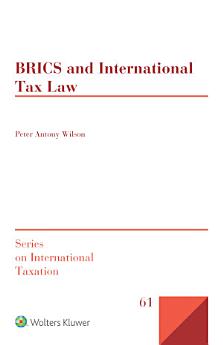BRICS and International Tax Law
Par šo e-grāmatu
The detailed analysis covers the entire eld of BRICS international tax law, considering topics such as the following:
– information exchange procedures and pitfalls; – response to the OECD’s Base Erosion and Pro t-Sharing (BEPS) initiative; – role of bilateral and multilateral double taxation conventions including the Multilateral Instrument and the Bilateral Investment Treaties; – thin capitalization; – transfer pricing; – controlled foreign corporation rules; – shortcomings related to authorities’ limited manpower; – international audit and investigation procedures; – the BRICS approach to residence and mandatory and binding arbitration; and – the BRICS approach to shaping the developing world’s international tax system.Notably, the author personally conducted interviews with senior international representatives of the BRICS tax authorities, as well as with leading BRICS academics and practitioners. Tax cases, together with human rights and investment cases and administrative guidelines in all ve countries are also included in the analysis. The study concludes with recommendations for improving each of the ve countries’ tax law and procedures, especially in the area of dispute resolution.
The author’s goal is to extend the existing body of knowledge of the BRICS’ international tax laws in order to assist in developing an understanding of the BRICS approach to dealing with evasion and avoidance: an approach which facilitates both outbound and inbound FDI, simpli es tax authority administration and establishes a basis for resolving international disputes which is compatible with sovereignty. In achieving this objective, the author has produced a major work that is of immeasurable value to tax advisers, government and governance of cials, academics and researchers both in developing international taxation strategies and in helping to resolve disputes with tax authorities.





